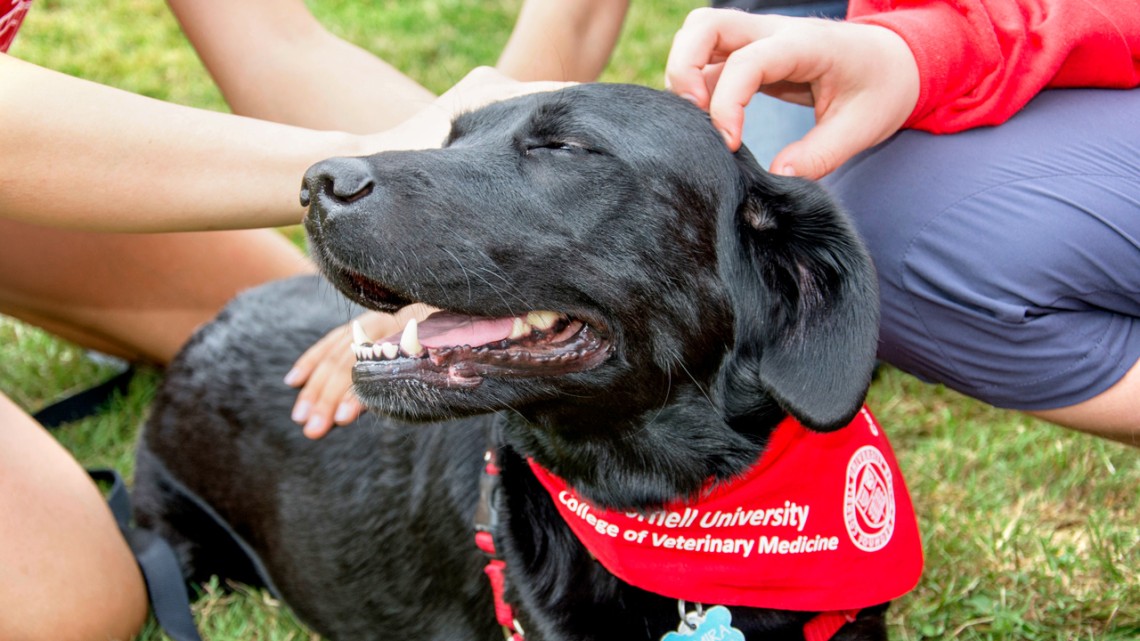
The Canine Health Center aims to become a leading source of research-based information about dogs.
Major gift helps launch Canine Health Center
By Krishna Ramanujan
A $30 million gift from Margaret and Richard Riney has endowed and named the Cornell Margaret and Richard Riney Canine Health Center at the College of Veterinary Medicine to improve the health and well-being of dogs through world-class research, outreach and engagement with dog lovers.
The transformational gift accelerates the center’s launch and endows funding critical for advancing canine health-related research and innovations.
“We were inspired by the college’s plans for a new Canine Health Center,” Margaret Riney said. “The ability to bring diverse expertise in canine-related research – from across the college, and across the university – under one umbrella, is a great way to catalyze the research process.”
“We know personally the importance and benefits of the relationships humans form with animals, especially with our pets,” Richard Riney said. “We wanted to support far-ranging research initiatives that may help dogs live their best lives, while recognizing that research into the canine condition can help to advance human medicine.”
The Rineys have focused their philanthropic efforts on health, education, the arts and animals through the Margaret and Richard Riney Family Foundation. They are especially interested in leveraging their philanthropy through funding research initiatives, an intention that fits well with the numerous ways the College of Veterinary Medicine has created opportunities for internal research support for its faculty.
“We are very pleased to see the vision of the Cornell Margaret and Richard Riney Canine Health Center coming to fruition,” said Dr. Lorin D. Warnick, Ph.D. ’94, the Austin O. Hooey Dean of Veterinary Medicine. “Through the Rineys’ visionary support, faculty and staff dedicated to canine health throughout the College of Veterinary Medicine and across the university will join together to advance research, discovery and public engagement to help dogs live longer, healthier and happier lives. This effort will also benefit veterinary care for other species and support the college’s work impacting human and public health.”
The College of Veterinary Medicine (CVM) – one of the leading veterinary colleges worldwide – is uniquely equipped to accommodate the Canine Health Center, with more than 50 researchers working on canine health-related research across many departments. Along with clinicians at the Cornell University Hospital for Animals, researchers at the Baker Institute for Animal Health and the Cornell Veterinary Biobank, and diagnosticians at the Animal Health Diagnostic Center, the university has the breadth of expertise and infrastructure to conduct and apply research at all levels, from basic discoveries to translational and clinical research to treatment delivery.
“As we raise awareness of canine health-related activities at the college, the Baker Institute will figure prominently, given its past, present, and future commitment to discoveries and advancements in canine health,” said Dr. Scott Coonrod, the Judy Wilpon Professor of Cancer Biology and director of the Baker Institute for Animal Health. “This generous gift will provide the catalyst needed to greatly accelerate our discovery-driven research at the Baker Instutute, the college, and across Cornell.”
The gift positions the Canine Health Center to become a leading source of research-based information about dogs. The funding will initially endow a significant internal grants program for canine health-related research, with particular emphasis on studying cancer, genetics and genomics, infectious diseases and immunology – building on Cornell’s current program strengths.
“The college has always funded internal projects, and this gift from the Riney Family Foundation will dramatically expand opportunities for our researchers,” said Dr. David Lee ’88, DVM ’94, MBA ’99, CVM’s associate dean for external programs.
“The Canine Health Center’s grants program will be particularly important for early-career faculty, to help them get started with seed funds to pursue innovative ideas before knowing if they should be proposed on a bigger scale,” Lee said. Such funding will also give the college a competitive advantage to recruit the best and brightest faculty, he added.
“This gift will allow investigators to design rigorous canine-specific programs without having to sacrifice or forsake important objectives due to budget or staffing constraints,” said Dr. Kelly Hume, associate professor of clinical sciences at CVM. “Ultimately, this will allow research and discovery to progress more quickly.”
The donation will also endow key strategic faculty positions that will aid in the recruitment of leading researchers to develop the center’s strategic vision and build on the college’s and Cornell’s strengths.
Along with benefitting from traditional support from Cornell and CVM alumni, former clients, industry practitioners and veterinarians, the center is especially interested in engaging dog lovers, who share a vested interest in canine health. The center plans to become a valued resource for people who care about dogs through special events, citizen science programs and clinical trials.
The launch of the Margaret and Richard Riney Canine Health Center comes at an unprecedented historical moment, as the pandemic allowed people to spend more time at home, strengthening many pet owners’ bonds with their animals. Breakthroughs and advancements in telehealth, diagnostics and therapeutics have made the potential for advancements in canine research greater than ever.
With that in mind, the center aims to establish itself as the most trusted source for information related to canine health – produced, delivered and endorsed by Cornell experts. The center’s website will feature useful health-related videos, online seminars, stories and explainers that address the needs of dog lovers and owners, breeders and veterinary healthcare providers. Online venues will be created to facilitate two-way communication between the center’s experts and content developers and the public.
“We’ve designed this model to be sustainable, growing, relevant and uniquely tailored to meet the needs of dog lovers,” Lee said.
Media Contact
Get Cornell news delivered right to your inbox.
Subscribe
